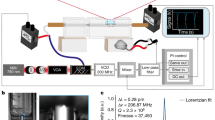Abstract
WHILE studying the guinea pig mast cell1, we have discovered a new chemical family of histological fixatives, namely, the glycol ethers. These alcohol derivatives, possessing both an ether and an alcohol group, are miscible with most liquids and are excellent solvents for a variety of substances completely insoluble in water. Marketed under the trade names of ‘Cellosolves’ and ‘Carbitals’, they have found wide use as solvents for cellulose esters in the lacquer industry. Conversely, they do coagulate and precipitate proteins as well as mucopolysaccharides.
This is a preview of subscription content, access via your institution
Access options
Subscribe to this journal
Receive 51 print issues and online access
$199.00 per year
only $3.90 per issue
Buy this article
- Purchase on Springer Link
- Instant access to full article PDF
Prices may be subject to local taxes which are calculated during checkout
Similar content being viewed by others
References
Shelley, W. B., and Florence, R., A Technique for the Study of Mast Cells : The Guinea Pig Mesentery (in the press).
Gray, P., The Microtomist's Formulary and Guide (Blakiston Co., New York, 1954).
Baker, J. R., Principles of Biological Microtechnique (John Wiley and Sons, Inc., 1958).
Author information
Authors and Affiliations
Rights and permissions
About this article
Cite this article
SHELLEY, W., FLORENCE, R. Ethylene Glycol Monomethyl Ether, a New Fixative for Histological Work. Nature 191, 719–720 (1961). https://doi.org/10.1038/191719a0
Issue Date:
DOI: https://doi.org/10.1038/191719a0
This article is cited by
-
Glycosaminoglycans of hair follicles of dog skin
The Histochemical Journal (1975)
-
Glycosaminoglycans of epidermis and dermal collagen in dog skin
The Histochemical Journal (1974)
-
Sodium rhodizonate staining of the keratogenous zone of the hair follicle and lingual papilla
Histochemie (1970)
-
Side effects of reaction media in histochemical blocking procedures
The Histochemical Journal (1969)
-
Studies in fluorescence histochemistry
Histochemie (1967)
Comments
By submitting a comment you agree to abide by our Terms and Community Guidelines. If you find something abusive or that does not comply with our terms or guidelines please flag it as inappropriate.



